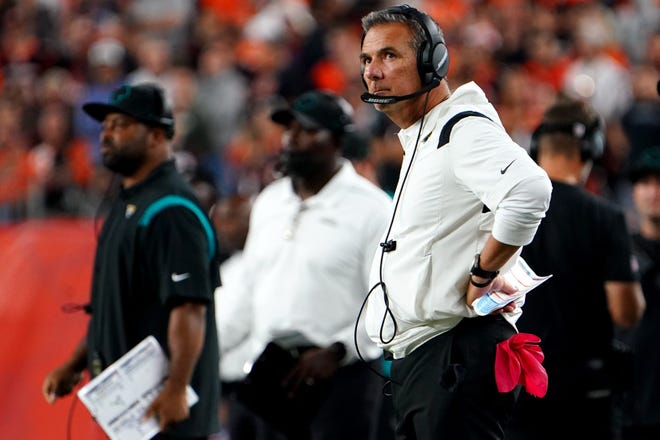
BELFAST, Northern Ireland — Twenty-five years after the U.S. helped broker peace in Northern Ireland, President Joe Biden heads to Belfast on Tuesday to celebrate an accord that ended three decades of bloodshed and is widely considered a major diplomatic success.
Yet Biden's visit comes as the Good Friday Agreement, which the Clinton administration helped orchestrate, is being tested by political turmoil.
Northern Ireland, part of the United Kingdom, has been without a government – as spelled out in the agreement – for more than a year amid a trade dispute following Brexit. The Northern Ireland Assembly isn't meeting. Executive Cabinet posts aren't filled.
And while the 1998 agreement largely ended sectarian violence, there are new reminders about the peace's fragility. Northern Ireland's terrorism threat level was recently raised to "severe" ahead of Biden's visit. Police disrupted a bomb plot targeted for Londonderry, Northern Ireland by members of the New IRA, a paramilitary group affiliated with the Irish Republican Army, according to The Belfast Telegraph.
More:'Simple dignity': How President Biden's visit to Ireland tells the story of 'Blue-collar Joe' back home
"For President Biden, this is a little bit of a tightrope to walk on: to emphasize, in broad terms, how the treaty has been successful, and perhaps maybe to ignore the fact that it's actually not working on the ground," said Christopher Maginn, professor of history at Fordham University, who specializes in Irish and British history.

How Brexit disrupted Northern Ireland's government
Biden, a Catholic with well-documented Irish roots, is set to deliver remarks in Belfast on the agreement's 25th anniversary Wednesday before visiting his ancestral home of Ireland for the next three days. British Prime Minister Rishi Sunak will also attend the Belfast ceremony.
"President Biden cares deeply about Northern Ireland and has a long history of supporting peace and prosperity there," said White House spokesman John Kirby.
The Good Friday Agreement established a devolved local government in Northern Ireland with power shared among Protestant loyalist parties that pushed to remain part of the U.K. and Catholic nationalist parties that sought to unify with the Republic of Ireland.

A power-sharing government can't function without both sides participating. And members of the Democratic Unionist Party – made up of conservatives who backed the United Kingdom's withdrawal from the EU – pulled out after Brexit.
They oppose a deal between the U.K. and EU that preserved the free flow of trade between Northern Ireland and the Republic of Ireland, which share the only land border between the U.K. and the EU.
"It is a time of mixed feelings because we're celebrating the anniversary but the power-sharing government isn't working," said David Mitchell, assistant professor in conflict resolution and reconciliation at Trinity College Dublin at Belfast.
More:In Northern Ireland, Brexit renews discussions on sovereignty and identity around an unclear border
Why fighting in Northern Ireland started
Elections in Northern Ireland are set in May, a moment that many observers believe will lead unionists to rejoin the the government. Regardless, the most important result of the Good Friday Agreement – ending the long conflict known as "The Troubles" – hasn't changed.
Northern Ireland was created in 1921, remaining a part of the U.K. when the rest of Ireland became an independent state.
In the 1960s, the Catholic minority in Northern Ireland became the subject of widespread discrimination. Protests led to the formation of paramilitary groups like the Irish Republican Army that fought to reunite Ireland. The British Army and unionist-backed paramilitary groups fought to suppress them.

The result was bombings, shootings and guerilla warfare from the 1960s into the 1990s that killed about 3,500 people and made Belfast a constant battle zone.
"Twenty-five years is longer than any other agreement has lasted here," said Peter McLoughlin, senior lecturer at Queens University, Belfast. "And whatever the difficulties we have – and our government is not working right now – this is the best form of democracy that anybody's come up with."
US 'should be proud' of pivotal role for peace
During peace talks, former Sen. George Mitchell, D-Maine, served as Clinton's special envoy leading peace talks in Norther Ireland. Mitchell was the main line of communication for opposing Northern Ireland camps that weren't talking to each other.
Northern Ireland has changed significantly since 1998. For the first time, Catholics outnumbered Protestants in Northern Ireland in last year's census.

Two leaders instrumental in fostering the Good Friday Agreement – David Trimble, the first First Minister of Northern Ireland, and John Hume, an Irish nationalist leader – died in recent years.
"There's a sense that that we need to keep sort of explaining the agreement to younger people who didn't live through the conflict," David Mitchell said. "That don't really understand what it's all about."
More:Rishi Sunak completes comeback, to become Britain's first prime minister of color
McLoughlin said he's "relatively confident" Northern Ireland will see a return of power sharing and a restored government
And although Biden won't be able to speak before a packed assembly in Northern Ireland, he said the anniversary is a "cause of celebration" and recognition of the key role the U.S. played.
"As a citizen here, I'm grateful to the American people, the American government, for the kind of patience they put in here," McLoughlin said. "It's something the U.S. people should be pretty proud of."

Contributing: Associated Press
Reach Joey Garrison on Twitter @joeygarrison.
Source link








